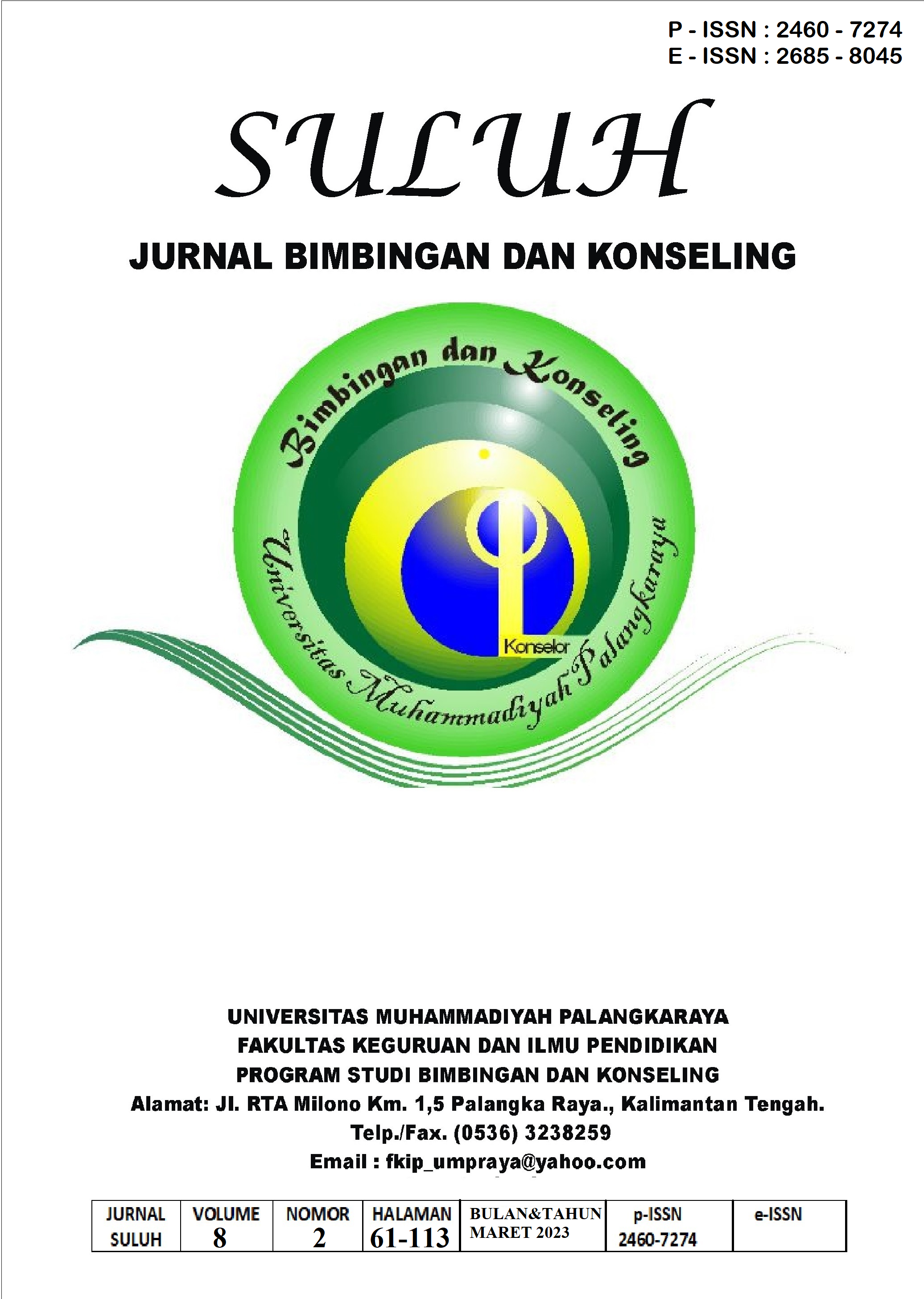PENGEMBANGAN SKALA BURNOUT KONSELOR DI KALIMANTAN TENGAH COUNSELOR BURNOUT SCALE DEVELOPMENT IN CENTRAL KALIMANTAN
Main Article Content
Abstract
Tujuan penelitian ini adalah Untuk mengembangakan Skala Burnout Konselor Di Kalimanatan Tengah dan untuk mengetahui kelayakan Skala Burnout Konselor Di Kalimanatan Tengah sehingga dapat digunakan sebagai alat ukur. Prosedur penelitian ini diadaptasi dari prosedur penelitian pengembangan yang telah diadaptasi sebelumnya, yang terdiri dari tiga tahap: tahap persiapan, tahap persiapan produk, dan tahap validasi atau uji produk. Analisis intrumen skala burnout menggunakan Alpha Cronbach's. Hasil analisis statistik reliabilitas 0,813, suatu pengukuran butir dinyatakan valid dan reliabel memperoleh jika skor r≥ 0,7. Berdasarkan uji validitas pengembangan skala burnout 25 item dapat digunakan sebagai inventori keperibadian.
Downloads
Article Details

This work is licensed under a Creative Commons Attribution-ShareAlike 4.0 International License.
All rights reserved. This publication may be reproduced, stored in a retrieval system, or transmitted in any form or by any means, electronic, mechanical, photocopying, recording.
References
Bakker, A. B., Van Der Zee, K. I., Lewig, K. A., & Dollard, M. F. (2006). The relationship between the big five personality factors and burnout: A study among volunteer counselors. The Journal of social psychology, 146(1), 31-50.
Bräuninger, I. (2012). Dance movement therapy group intervention in stress treatment: A randomized controlled trial (RCT). The Arts in Psychotherapy, 39, 443–450. doi:10.1016/j.aip.2012.07.002
Butler, S. K., & Constantine, M. G. (2005). Collective self-esteem and burnout in professional school counselors. Professional School Counseling, 9(1), 2156759X0500900107.
Coaston, S. C. (2017). Self-Care through Self-Compassion: A Balm for Burnout. Professional Counselor, 7(3), 285-297.
Demerouti, E., Bakker, A. B., De Jonge, J., Janssen, P. P., & Schaufeli, W. B. (2001). Burnout and engagement at work as a function of demands and control. Scandinavian journal of work, environment & health, 279-286.
Gilliland, B. E., & James, R. K. (2001). Crisis Intervention Strategies. Pacific Grove, CA: Brooks/Cole-Thomson Learning.
Halbesleben, J. R. (2010). A meta-analysis of work engagement: Relationships with burnout, demands, resources, and consequences. Work engagement: A handbook of essential theory and research, 8(1), 102-117.
Jenaro, C., Flores, N., & Arias, B. (2007). Burnout and coping in human service practitioners. Professional Psychology: Research and Practice, 38, 80–87. doi:10.1037/0735-7028.38.1.80
Johnson, S. M. (2015). Reducing teacher stress and burnout in high-risk secondary schools in South Africa using transactional analysis. International Journal of Transactional Analysis Research & Practice, 6(1).
Lee, R. T., & Ashforth, B. E. (1996). A meta-analytic examination of the correlates of the three dimensions of job burnout. Journal of applied Psychology, 81(2), 123.
Lee, S. M., Baker, C. R., Cho, S. H., Heckathorn, D. E., Holland, M. W., Newgent, R. A., ... & Yu, K. (2007). Development and initial psychometrics of the Counselor Burnout Inventory. Measurement and Evaluation in Counseling and Development, 40(3), 142-154.
Marich, J., & Howell, T. (2015). Dancing mindfulness: A phenomenological investigation of the emerging practice. EXPLORE: The Journal of Science and Healing, 11, 346–356.
Moyer, M. (2011). Effects of Non-Guidance Activities, Supervision, and Student-to-Counselor Ratios on School Counselor Burnout. Journal of School Counseling, 9(5), n5.
Rosenberg, T., & Pace, M. (2006). Burnout among mental health professionals: Special considerations for the marriage and family therapist. Journal of Marital and Family Therapy, 32(1), 87–99. doi:10.1111/j.1752- 0606.2006.tb01590
Schaufeli, W. B., & Bakker, A. B. (2004). Job demands, job resources, and their relationship with burnout and engagement: A multi‐sample study. Journal of Organizational Behavior: The International Journal of Industrial, Occupational and Organizational Psychology and Behavior, 25(3), 293-315.
Setyoningtyas, R. (2014). Persepsi guru bk tentang kompetensi konselor di sekolah dasar swasta kota semarang(Doctoral dissertation, Universitas Negeri Semarang).
Shin, H., Park, Y. M., Ying, J. Y., Kim, B., Noh, H., & Lee, S. M. (2014). Relationships between coping strategies and burnout symptoms: A meta-analytic approach. Professional Psychology: Research and Practice, 45(1), 44.
Syarif, D. F. T., Fatchurahman, M., & Karyanti, K. (2022). Pelatihan Self Healing Untuk Mengurangi Burnout Konselor Sekolah. Jurnal ABDINUS : Jurnal Pengabdian Nusantara, 6(1), 178-188. https://doi.org/10.29407/ja.v6i1.16804
Thériault, A., Gazzola, N., & Richardson, B. (2009). Feelings of incompetence in novice therapists: Consequences, coping, and correctives. Canadian Journal of Counselling and Psychotherapy, 43(2).
Triwahyuni, A., Purwono, U., Sadarjoen, S. S., & Sapri, E. R. (2019). Pengembangan Millon Personality Type Inventory (Mpti) Sebagai Instrumen Pengukuran Kepribadian Di Indonesia. Journal of Psychological Science and Profession, 3(2), 65-74.
Wachter, C. A., Clemens, E. V., & Lewis, T. F. (2008). Exploring school counselor burnout and school counselor involvement of parents and administrators through an Adlerian theoretical framework. Journal of Individual Psychology, 64(4), 432-449.

